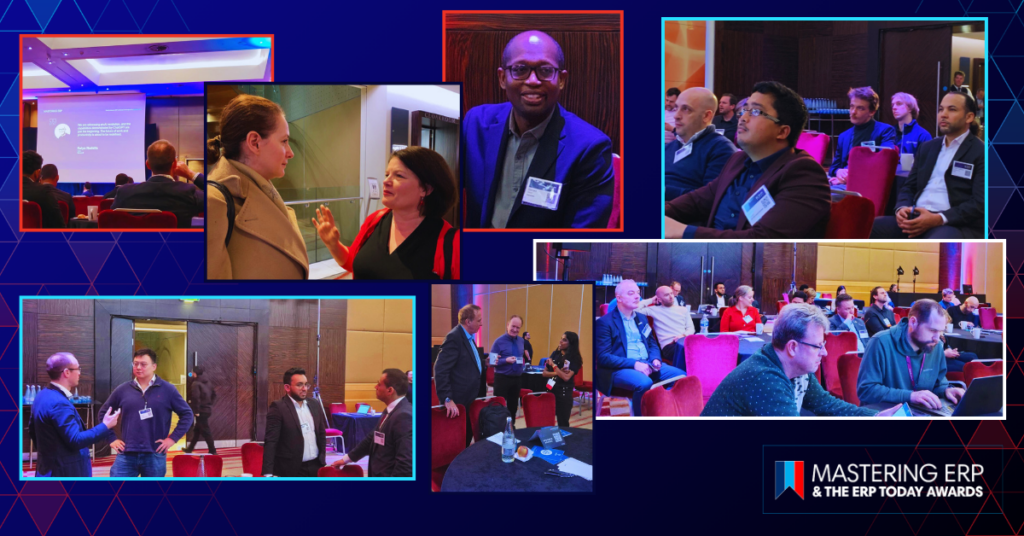In the ERP technology landscape, there are certain individuals who distinguish themselves as pioneers, carving out the future trajectory of the industry. One such standout is Stephanie Poore, the recently appointed managing director of IFS, UK and Ireland. Here’s a closer look at Poore’s inspiring journey.
During a special edition of our previously jointly-hosted podcast, WERP (Women in ERP), Stephanie Poore offers up an insightful glimpse into her own professional journey. As part of the ride, she touches upon the diverse and varied landscape of the tech sector, and the continuous transformation of IFS Cloud – particularly emphasizing the critical importance of integrating AI in today’s enterprise technology use cases.
Tapping into technology talent
Poore’s career trajectory paints a detailed portrait of the adaptability, resilience and tenacity necessary to not only survive but to truly excel in the exciting, dynamic world of ERP technology. From starting out her career with a strong background in economics and initial experience in the burgeoning field of ecommerce, Poore built a rich and diverse portfolio of experiences.
Following graduating from university with a degree in Economics, Poore reminisces: “Initially, I delved into the world of economics, working in the City of London where I engaged in various tasks for startups, focusing on supply chain dynamics and e-commerce, collaborating with retailers and wholesalers.”
This led Poore to a phase where she directly collaborated with suppliers for major retailers, traversing to China and undertaking a multitude of unexpected responsibilities. “Reflecting on those moments now, the journey has been diverse, but it has uniquely prepared me for my current position, where I collaborate with thousands of manufacturers,” the MD notes.
Sheer grit has been crucial to her ascent, particularly as a woman navigating the predominantly male-dominated tech industry.
As Poore explains, it was through amassing these experiences, over time, that propelled her to a key leadership position within the global enterprise software powerhouse, IFS.
“It’s been something I’ve been working towards for a long time, so the expression ‘blood, sweat and tears’ kind of springs to mind,” she candidly shares. It’s a sentiment that encapsulates the tireless effort, unwavering determination and sheer grit that have been crucial to her ascent, particularly as a woman navigating the predominantly male-dominated tech industry.
Widening the pool
Taking even a quick glance at the figures shows the stark reality; a mere five percent of leadership roles in the tech industry are filled by women, as per reports by PwC. This alarming statistic underscores a deep-rooted, systemic issue that demands immediate attention and targeted, intentional action.
There’s a huge wealth of talent that’s pretty much untapped or under-tapped.
For Poore, it’s clear to see that there is a huge and largely unrecognized potential for diversity when it comes to sparking innovation. The type that, if harnessed, could foster fresh perspectives and drive that much sought-after change in the tech ecosystem. She astutely observes, “There’s a huge wealth of talent that’s pretty much untapped or under-tapped.”
Not to mention that by harnessing this diversity, the industry can effectively address many of the most pressing issues felt today, such as the acute skills shortage and an aging workforce, thereby helping to secure its future sustainability.
Yet, attracting a diverse pool of talent poses a significant set of challenges. One branch of that is, as Poore emphasizes, the critical need for an increased visibility of diverse leaders as a catalyst for meaningful change.
“It’s about increasing the visibility and level of engagement to further connect our community,” she states.
Poore’s argument hits the bullseye – highlighting and celebrating the achievements of such leaders can serve as a powerful motivator, and it serves to reinforce the wealth of untapped potential of inclusivity to drive industry-wide transformation.
Dream big. Don’t devalue yourself in the process.
The ERP sector, however, faces its own set of unique challenges, such as seamlessly integrating AI, enhancing security measures and addressing the critical skills gap. As visionaries in ERP, we recognize and underscore the urgent need for vendors like IFS to bridge this skills gap.
The pressing need for varied perspectives in leadership is abundantly clear. Poore’s advice to emerging leaders in ERP is to “dream big, don’t devalue yourself in the process.”
The notion echoes the sentiments of many leaders in the tech industry, who recognize the crucial role of mentorship and support in nurturing and developing the next generation of leaders. With numerous challenges on the path to success in ERP technology, the journey may be arduous, but with the right mix of drive, talent, resilience and perseverance, anyone can make a significant and lasting impact.
Technology can help, not hinder diversity
Looking ahead, Poore’s vision for IFS revolves around nurturing a positive, inclusive culture. “I want a team of people that are proud and love working for the company, that want to be there. That will go above and beyond because they love it,” she shares.
It’s a vision that includes breaking down software and functional silos, placing data at people’s fingertips, and creating a culture that encourages innovation and growth. She believes that this approach will add immense value to both IFS and its customers. Plus, with a strong focus on AI integration, Poore affirms that “AI is going to play an absolutely integral role” in shaping the future of ERP technology, bringing about positive changes in gender diversity, inclusivity and representation.
Though many fear the contrary, for Poore, the integration of AI in ERP actually holds immense potential in mitigating biases within hiring, promotion and performance evaluation processes. By analyzing historical data and patterns, AI algorithms can identify and address instances of bias, fostering fairer decision-making practices. AI-powered recruitment tools can significantly contribute to attracting a more diverse pool of candidates by extending the reach of advertisements and utilizing language that resonates with various backgrounds.
But it’s true, AI stands as both a beacon of opportunity and a realm of challenges. As Poore reflects on her journey, she says, “I’ve come to realize that the true essence of AI lies in its ability to connect the dots within vast pools of data. It’s more than mere functionality; it’s the art of harnessing the power embedded in data.”
A significant step for Poore here has been obtaining a co-pilot license with Microsoft and, now, embracing tools like ChatGPT has become part of her daily ritual, and an integral part of her professional toolkit.
I’m not competing against AI itself, but against someone else effectively utilizing it.
Understanding that not everyone shares the same enthusiasm for AI, Poore notes thoughtfully that, “Someone once told me that I’m not competing against AI itself, but against someone else effectively utilizing it.”
This insight fueled her initiative to empower her sales team, unveiling the untapped potential of AI for their advantage. It’s clear that as AI tools, including co-pilot, gain widespread adoption, skepticism will continue to wane. Yet, a significant challenge surfaces in the accessibility of input data to anyone. Mindfulness becomes paramount and, while organizations like IFS employ security measures, the broader landscape lacks universal awareness and policies.
In tackling concerns about inequality, the nuanced behavior of AI, such as, for instance, adapting responses based on perceived laziness on Fridays, sheds light on the need for a comprehensive understanding of AI’s impact. It’s a reminder that AI is not a mere search engine; it intricately pulls and processes information in ways that reflect the complexities of our world.
There is also a significant environmental cost to using AI that organizations and users should be aware of now and looking ahead, with each query to these models apparently demanding the cooling equivalent of a bottle of water. Something businesses conscious of sustainability drivers will need to take into account, Poore notes.
Poore’s inspiring journey underscores the critical importance of gender diversity, inclusivity and representation in the tech sector. As the industry continues to evolve and push boundaries, we must ensure that our efforts are deeply rooted in fostering diversity. After all, it’s the convergence of diverse minds, ideas and perspectives that truly drives innovation and transformation. Let’s strive to create an environment where everyone, regardless of their background, can thrive, make meaningful contributions and help shape the future of technological evolution. Let’s inspire inclusion.
Abigail Allman is the founder of WERP, UN Women UK Delegate, and head of GTM and partnerships at Resulting IT.






